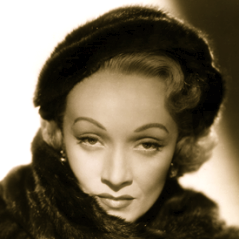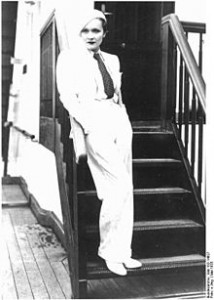Marlene Dietrich

Marlene Dietrich “Mysteries & Scandals”
 Marlene Dietrich, aged 49 (in 1951)
Marlene Dietrich, aged 49 (in 1951)
Dietrich remained popular throughout her long career by continually re-inventing herself, professionally and characteristically. In the Berlin of the 1920s, she acted on the stage and in silent films. Her performance as “Lola-Lola” in The Blue Angel, directed by Josef von Sternberg, brought her international fame and provided her a contract with Paramount Pictures in the US. Hollywood films such as Shanghai Express and Desire capitalised on her glamour and exotic looks, cementing her stardom and making her one of the highest-paid actresses of the era. Dietrich became a US citizen in 1939, and throughout World War II she was a high-profile frontline entertainer. Although she still made occasional films in the post-war years, Dietrich spent most of the 1950s to the 1970s touring the world as a successful show performer.Marlene Dietrich (German pronunciation: [maɐˈleːnə ˈdiːtʁɪç]; 27 December 1901 – 6 May 1992) was a German-American actress and singer.
In 1999, the American Film Institute named Dietrich the ninth-greatest female star of all time.
Childhood
 Situation of Marlene Dietrich’s & Alfred Lion’s Birthplace on the “Rote Insel“
Situation of Marlene Dietrich’s & Alfred Lion’s Birthplace on the “Rote Insel“
Marie Magdalene Dietrich was born on 27 December 1901 in Leberstrasse 65 on the Rote Insel in Schöneberg, now a district of Berlin, Germany. She was the younger of two daughters (her sister Elisabeth being a year older) of Louis Erich Otto Dietrich and Wilhelmina Elisabeth Josephine (née Felsing), who married in December 1898. Dietrich’s mother was from a well-to-do Berlin family who owned a clockmaking firm and her father was a police lieutenant. Her father died in 1907. His best friend, Eduard von Losch, anaristocrat first lieutenant in the Grenadiers, courted Wilhelmina and eventually married her in 1916, but he died soon after as a result of injuries sustained during World War I. Eduard von Losch never officially adopted the Dietrich children, hence Dietrich’s surname was never von Losch, as has sometimes been claimed. She was nicknamed “Lena” and “Lene” (pronounced Lay-neh) within the family. Around the age of 11, she contracted her two first names to form the name “Marlene”.
Dietrich attended the Auguste-Viktoria girls school from 1907–1917 and graduated from the Victoria-Luisen-Schule (today Goethe-Gymnasium). the following year. She studied the violin and became interested in theatre and poetry as a teenager. Her dreams of becoming a concert violinist were cut short when she injured her wrist, but by 1922 she was employed as a violinist in a pit band accompanying silent films at a cinema in Berlin – her first job, from which she was fired after only four weeks.
Early career
 Even at the start of her film career, Dietrich would often include masculine clothes in her wardrobe, giving herself an androgynous quality
Even at the start of her film career, Dietrich would often include masculine clothes in her wardrobe, giving herself an androgynous quality
Her earliest professional stage appearances were as a chorus girl on tour with Guido Thielscher’s Girl-Kabarett, vaudeville-style entertainments, and in Rudolf Nelson revues in Berlin. In 1922, Dietrich auditioned unsuccessfully for theatrical director and impresario Max Reinhardt‘s drama academy; however, she soon found herself working in his theaters as a chorus girl and playing small roles in dramas, without attracting any special attention at first. She made her film debut playing a bit part in the 1922 film, So sind die Männer.
She met her future husband, Rudolf Sieber, on the set of another film made that year,Tragödie der Liebe. Dietrich and Sieber were married in a civil ceremony in Berlin on 17 May 1923. Her only child, daughter Maria Elisabeth Sieber, was born on 13 December 1924.
Dietrich continued to work on stage and in film both in Berlin and Vienna throughout the 1920s. On stage, she had roles of varying importance in Frank Wedekind‘s Pandora’s Box, William Shakespeare‘s The Taming of the Shrew and A Midsummer Night’s Dream as well as George Bernard Shaw‘s Back to Methuselah and Misalliance. It was in musicals and revues, such as Broadway, Es Liegt in der Luft and Zwei Krawatten, however, that she attracted the most attention. By the late 1920s, Dietrich was also playing sizable parts on screen, including Café Elektric (1927), Ich küsse Ihre Hand, Madame (1928) and Das Schiff der verlorenen Menschen (1929).

